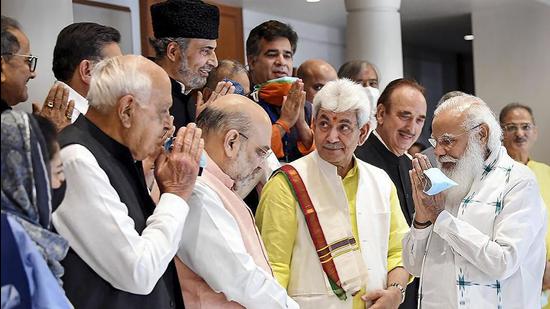New Delhi | Ramakant Chaudhary: Asserting the development of Jammu and Kashmir with focus on youth as well as assuring his commitment to restoring full statehood at the right time, Prime Minister said he wanted to remove ‘Dilli Se Doori’ as well as ‘Dil Ki Doori’ (distance from Delhi as well as distance of heart) in a high-octane meeting with 14 mainstream Jammu and Kashmir leaders from eight political parties. Union Home Minister Amit Shah, National Security Advisor Ajit Doval, four former chief ministers of the erstwhile state — Farooq Abdullah and his son Omar Abdullah of the National Conference, Congress’s Ghulam Nabi Azad and Peoples Democratic Party chief Mehbooba Mufti — were among those who attended the three-and-a-half-hour-long meeting.

The key takeaway of the meet was that all attendees broke ice with the Centre and struck a positive note and optimism. After huddling together their words as well as body language rammed home clear-cut points that they wanted to work with the people of Jammu and Kashmir to strengthen democracy at the grassroots. Notably, such political bonhomie between the central leadership and mainstream parties prevailed even after many state leaders were put in prison or under house arrest as they poured out bitterness and resentment when Modi-led ruling establishment at the Centre revoked Jammu and Kashmir’s special status under Article 370 of the Constitution and bifurcated it into union territories of Jammu and Kashmir and Ladakh in August 5, 2019.
Albeit there was a trust deficit, both sides have traveled to reduce the distance between the Lal Qila and Lal Chowk. It reminisced about the buzz of catchphrase: Insaniyat (humanism), Jamhoo-riyat (democracy) and Kashmiriyat (Hindu-Muslim amity) given by Atal Behari Vajpayee, who led the NDA government, on January 23, 2004 when he had met Kashmiri separatist leaders.
Speaking with newsmen, Omar Abdullah of the National Conference acknowledged, “It was the first step in the right direction. The main takeaway is that the Central government is keen to restore an elected government in Jammu and Kashmir at the earliest. PM Modi said his government was fully committed to taking forward the democratic process in Jammu and Kashmir against the backdrop of a three-tier Panchayati Raj system which is in place for the first time in the Union Territory.
“Our priority is to strengthen grassroots democracy in J&K. Delimitation has to happen at a quick pace so that polls can happen and J&K gets an elected Government that gives strength to J&K’s development trajectory,” the Prime Minister tweeted.
Though the Centre’s action to strip Jammu and Kashmir of special status by nullifying Article 370 hit political hornets’ nest and was vehemently criticized by state leaders and the Opposition, it was not seen as a sticking point for discussions in the all-party meet. None of the political leaders took maximalist positions at the meeting. They called spade a spade that the Prime Minister was all ears, and heard out suggestions and inputs from all participants.
PM Modi is reported to have expressed happiness on the commitment to the Constitution and democracy espoused by all participants. He said that even one death in Jammu and Kashmir is painful and it is the collective duty to protect the younger generation.

Now it is the bounden duty of Jammu-Kashmir leaders of all schools of political thoughts and particularly the people of Valley to keep the warmth of such democratic sit-down on by burying all cynicisms and flashpoints which have witnessed bloodbaths, violence, unrest and terrorism that have reduced the state’s glorious stature of haven of the earth to the place of murders and mayhem. If the state’s regional leadership works in sync with the spirit of PM Modi’s olive branch of removing Dil Ki Doori and Dilli Se Doori, this meeting could be a harbinger of “Naya Kashmir” that will always remain the crown of India.
(Ramakant Chaudhary is a journalist and political commentator. The views expressed are personal.)









